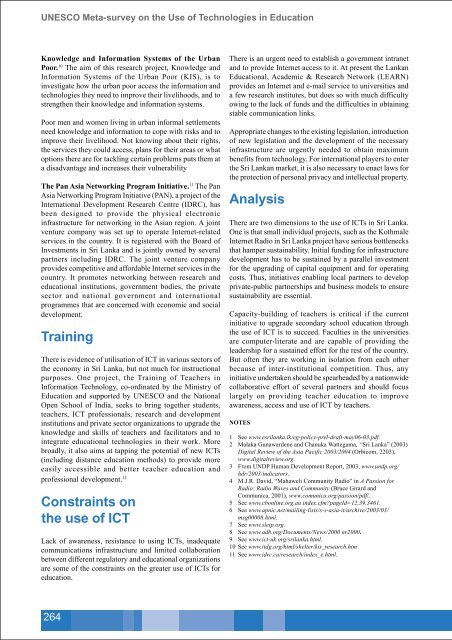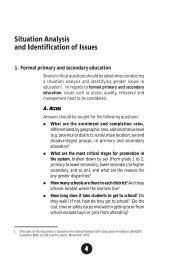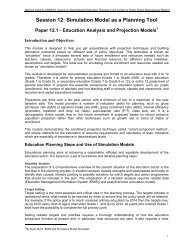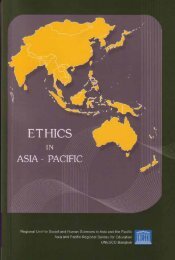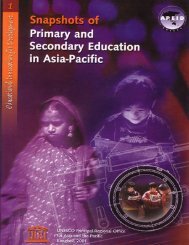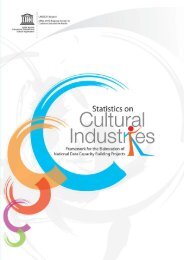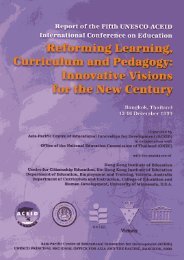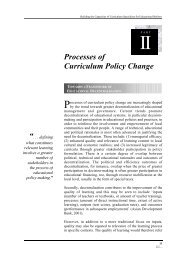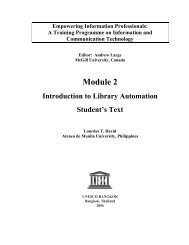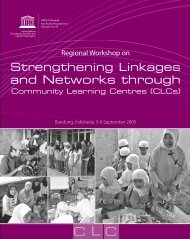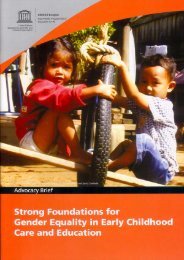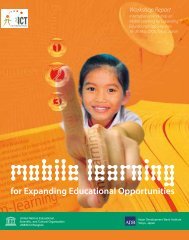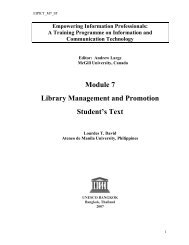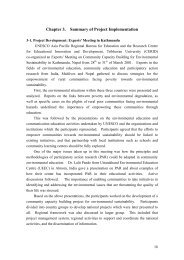Download (PDF, 2.MB) - UNESCO Bangkok
Download (PDF, 2.MB) - UNESCO Bangkok
Download (PDF, 2.MB) - UNESCO Bangkok
- No tags were found...
You also want an ePaper? Increase the reach of your titles
YUMPU automatically turns print PDFs into web optimized ePapers that Google loves.
<strong>UNESCO</strong> Meta-survey on the Use of Technologies in EducationKnowledge and Information Systems of the UrbanPoor. 10 The aim of this research project, Knowledge andInformation Systems of the Urban Poor (KIS), is toinvestigate how the urban poor access the information andtechnologies they need to improve their livelihoods, and tostrengthen their knowledge and information systems.Poor men and women living in urban informal settlementsneed knowledge and information to cope with risks and toimprove their livelihood. Not knowing about their rights,the services they could access, plans for their areas or whatoptions there are for tackling certain problems puts them ata disadvantage and increases their vulnerabilityThe Pan Asia Networking Program Initiative. 11 The PanAsia Networking Program Initiative (PAN), a project of theInternational Development Research Centre (IDRC), hasbeen designed to provide the physical electronicinfrastructure for networking in the Asian region. A jointventure company was set up to operate Internet-relatedservices in the country. It is registered with the Board ofInvestments in Sri Lanka and is jointly owned by severalpartners including IDRC. The joint venture companyprovides competitive and affordable Internet services in thecountry. It promotes networking between research andeducational institutions, government bodies, the privatesector and national government and internationalprogrammes that are concerned with economic and socialdevelopment.TrainingThere is evidence of utilisation of ICT in various sectors ofthe economy in Sri Lanka, but not much for instructionalpurposes. One project, the Training of Teachers inInformation Technology, co-ordinated by the Ministry ofEducation and supported by <strong>UNESCO</strong> and the NationalOpen School of India, seeks to bring together students,teachers, ICT professionals, research and developmentinstitutions and private sector organizations to upgrade theknowledge and skills of teachers and facilitators and tointegrate educational technologies in their work. Morebroadly, it also aims at tapping the potential of new ICTs(including distance education methods) to provide moreeasily accessible and better teacher education andprofessional development. 12Constraints onthe use of ICTLack of awareness, resistance to using ICTs, inadequatecommunications infrastructure and limited collaborationbetween different regulatory and educational organizationsare some of the constraints on the greater use of ICTs foreducation.There is an urgent need to establish a government intranetand to provide Internet access to it. At present the LankanEducational, Academic & Research Network (LEARN)provides an Internet and e-mail service to universities anda few research institutes, but does so with much difficultyowing to the lack of funds and the difficulties in obtainingstable communication links.Appropriate changes to the existing legislation, introductionof new legislation and the development of the necessaryinfrastructure are urgently needed to obtain maximumbenefits from technology. For international players to enterthe Sri Lankan market, it is also necessary to enact laws forthe protection of personal privacy and intellectual property.AnalysisThere are two dimensions to the use of ICTs in Sri Lanka.One is that small individual projects, such as the KothmaleInternet Radio in Sri Lanka project have serious bottlenecksthat hamper sustainability. Initial funding for infrastructuredevelopment has to be sustained by a parallel investmentfor the upgrading of capital equipment and for operatingcosts. Thus, initiatives enabling local partners to developprivate-public partnerships and business models to ensuresustainability are essential.Capacity-building of teachers is critical if the currentinitiative to upgrade secondary school education throughthe use of ICT is to succeed. Faculties in the universitiesare computer-literate and are capable of providing theleadership for a sustained effort for the rest of the country.But often they are working in isolation from each otherbecause of inter-institutional competition. Thus, anyinitiative undertaken should be spearheaded by a nationwidecollaborative effort of several partners and should focuslargely on providing teacher education to improveawareness, access and use of ICT by teachers.NOTES1 See www.esrilanka.lk/eg-policy-prel-draft-may06-03.pdf.2 Malaka Gunawardene and Chanuka Wattegama, “Sri Lanka” (2003)Digital Review of the Asia Pacific 2003/2004 (Orbicom, 2203),www.digitalreview.org.3 From UNDP Human Development Report, 2003, www.undp.org/hdr/2003/indicators.4 M.J.R. David, “Mahaweli Community Radio” in A Passion forRadio: Radio Waves and Community (Bruce Girard andCommunica, 2001), www.comunica.org/passion/pdf/.5 See www.cbonline.org.au index.cfm?pageId=12,39,3461.6 See www.apnic.net/mailing-lists/s-s-asia-it/archive/2003/03/msg00008.html.7 See www.sletp.org.8 See www.adb.org/Documents/News/2000 nr2000.9 See www.ict-uk.org/srilanka.html.10 See www.itdg.org/html/shelter/kis_research.htm11 See www.idrc.ca/research/index_e.html.264


